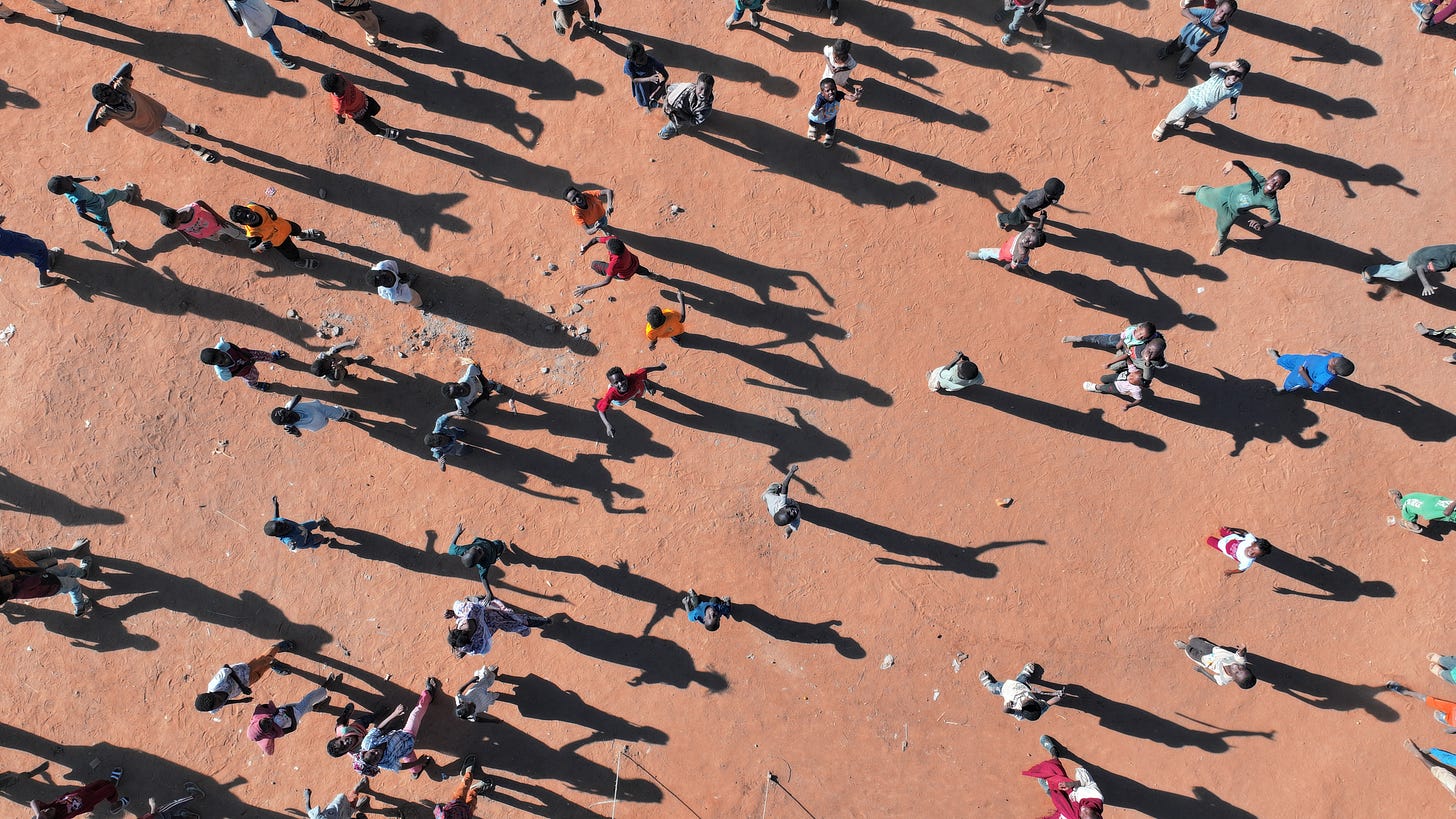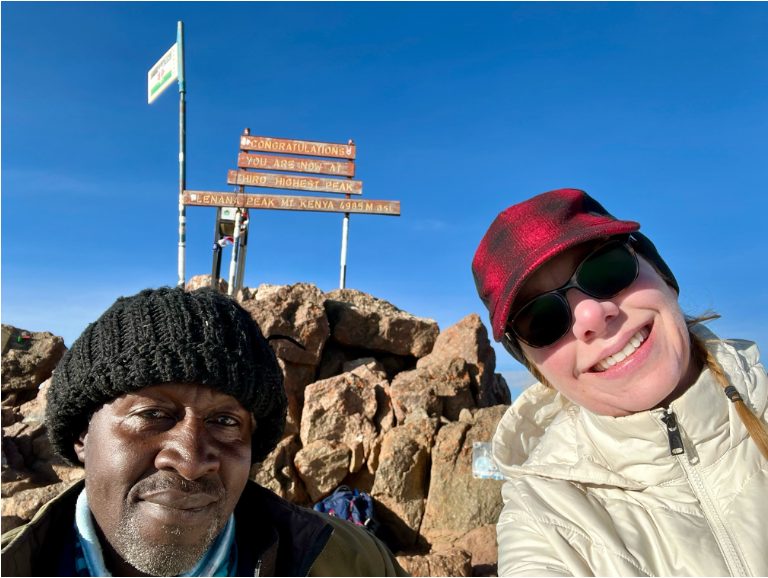The Future Has an African Horizon
The world's second-largest continent is full of unexpected wonders and infinite potential.

IN MY EXPERIENCE, MOST AMERICANS—regardless of race, class, or education level—neither know nor care much about Africa. American presidential administrations have generally deemed the continent a low priority in a world full of toils and snares. Africa usually enters the conversation only when something goes terribly wrong—terrorist attacks, humanitarian calamities, disease outbreaks, wars. Even then, it’s hard for African stories to break through. The International Rescue Committee declared the Sudanese Civil War the worst humanitarian disaster ever recorded, yet most Americans probably could not find Sudan on a map, much less tell you anything about that conflict.
To the extent Americans do hear or think about Africa, it’s probably because of stories of famine and tragedy and violence. You’ve seen images of suffering children, refugees, and drought. But if you look a bit closer, if you care just a little bit more, you will hear stories of resilience, courage, and cooperation. Of Dr. Dennis Mukwege, a Nobel laureate, who has dedicated his life to healing the physical and invisible wounds of Congolese rape survivors in one of the most conflict-ridden regions of the world. Or Sudan’s Resistance Committees, networks of ordinary neighbors, often led by women, who brought down a dictator and now fight to care for each other as two military forces ravage the country, competing to succeed him. I would recall for you how, amidst some of the worst hyperinflation in history, I saw Zimbabweans working for little if any pay to collect trash and repair roads and keep their society afloat as the economy collapsed around them. Or how women in Sierra Leone came together to help end one of the continent’s bloodiest wars.
To argue that Africa has direct bearing on American interests, I could offer a list of bullet points and charts, as I have done for skeptical policymakers for decades. I could focus on the negative—how weak governance, economic instability, and the disproportionate impact of climate change fuel terrorism, illicit finance, smuggling, piracy, disease, conflict, and migration. I could tell you that our adversaries—Russia and China, and to a lesser extent Iran and North Korea—are aggressively exploiting the continent’s poverty, insecurity, natural resources, and economic potential to gain a geopolitical edge. China is practically buying up whole countries with exploitative loans, and Russia is undermining democracies with armies-for-hire and disinformation while plundering gold and diamonds. Incidentally, the dismantling of USAID is not only a humanitarian disaster for Africa, it is a gift to our adversaries.
Or I could focus on the positive, like the tremendous economic potential of Africa’s abundant natural resources, innovative spirit, and astounding demographic growth—the continent will have 2.6 billion people by 2050. I could tell you about the hundreds of millions of Africans who are already consumers, and the 250 million more who will join them by 2030, unlocking $3 trillion in consumer spending. I could emphasize that while the developed world stands on the edge of a demographic cliff, Africa will have an abundant supply of workers, an increasing percentage of whom are well educated, speak English, and live in relatively stable countries.
I could also mention that sub-Saharan African migration to the United States has been growing rapidly for decades, and that immigrants from this region are better educated, more likely to work, and more likely to speak English at home compared to other immigrants.
I’m not arguing that Americans should spend the better part of their lives studying, watching, living, rejoicing in, absorbing Africa as I have. I’m just saying that it’s worth a little more of our attention. I could give you the data and the logical arguments, which are compelling and essential for influencing policy in a crowded field of competing interests and finite resources. But for me, facts and figures seem wholly inadequate to convey the importance of Africa. The continent has mattered to me as much as my own heart since my missionary parents moved me there at age 8. Data cannot capture the unending gift of it.
I’D RATHER TELL YOU WHAT A SUNSET looks like over the vast expanse of the Great Rift Valley, where some of our earliest ancestors made their home. Or describe the bracing cold of the Kenyan highlands when the equatorial sun gives way to clouds of stars. I would try to find words for the blurry grace of the Earth’s fastest land mammal hitting her stride. I’d describe the awe of being surrounded by the gentle, terrifying flow of an elephant herd, knowing any one of its number could flip your car like a coin. Or I’d tell you what it feels like to float on the sunrise over the savannah in a hot air balloon.
I wonder if you know that one of the oldest Christian traditions in the world still thrives in Ethiopia, where ancient churches are carved like secret chambers into granite. I’d urge you to go to Great Zimbabwe to see the well-preserved ruins of a sophisticated kingdom that thrived almost a thousand years ago. Or the tens of thousands of cave etchings tens of thousands of years old that dot southern Africa.
Or I might tell you about James, who worked for our family as a young man and went on to be a successful comedian. I would introduce you to Philemon, a civil servant in western Kenya who ministers to the physical and spiritual needs of a marginalized community a few hours north with his own time and money. I would definitely want you to meet Nancy, a single mother in rural Tanzania who got up in the middle of the night to take me and my seriously injured friend to the hospital and stayed with us throughout what turned into a 24-hour ordeal. I’d mention my dear friend Moses, a safari operator who never meets a stranger, human or animal, and can get his Land Cruiser through the most intractable mud hole. Or how Sammy, who has been climbing 17,000-foot Mt. Kenya for forty years, soothed the anxiety of a sobbing middle-aged American lady so she could fulfill a dream of summiting the mountain in whose shadow she had grown up.
I would describe the Kikuyu women who walk down the road chatting and knitting, with loads of wood tied to their backs and babies attached to their chests. And the waist-high boys who simultaneously herd goats and play soccer with balls fashioned from plastic bags and rags. I’d try to capture the improbable joy of South Sudanese people bathing in the Nile as the sun sets on a young nation that just can’t catch a break. I’d want you to hear of the communities who have tied their livelihoods to the wildlife with whom they once competed, caring for them as their own children so that our children’s children can experience their majesty. Or the rangers who risk their lives battling poachers to protect some of the last members of disappearing species.
I could tell you about the astounding art, by artists of world renown and of roadside stands. Or the vibrant colors and flavors of fabric and food and fruit. Or the infectious rhythms of Grammy-nominated Afrobeats stars and humble choirs in mud-walled churches. Or the prophetic work of writers like Chinua Achebe and Ngũgĩ wa Thiong’o, and the lyrical narratives of NoViolet Bulawayo and Imbolo Mbue.
You might be surprised to hear that Kenyan tech entrepreneurs pioneered mobile money and crowd sourcing during emergencies and elections. Or that Kenya is a climate leader, with 90 percent of its power derived from renewables. If you haven’t tasted Kenyan tea or Ethiopian coffee or South African wine or some of the fiercely competitive varieties of West African jollof rice, you will want to remedy that immediately. And I must teach you a few of my favorite Swahili words, like “shaghalabaghala,” the meaning of which is close to its sound, something equivalent to “clusterf***.” Trust me, you need that word in your vocabulary. Especially these days.
I could go on, but it still would not scratch the surface of all Africa contains, to teach us and show us and change us, if we would allow it. Africa is sunny skies and fragrant rains and parched earth and cruel floods. It is wide smiles and withering heartbreak. It is rutted roads paved with perseverance, the ferocity of family, the embrace of community, and the welcoming of strangers. It is the prison of poverty and the shamelessness of dictators and far too many stillborn dreams.
But it’s also a freedom Americans have forgotten—freedom from the illusion of control, the relentlessness of choice, the scarcity of time, the loneliness of privilege, and the insatiability of success.
I’M OFTEN ASKED WHY AFRICA MATTERS. It’s an understandable question in a world of real responsibilities, real demands, and realpolitik. And an easy one, as it holds fewer uncomfortable implications and demands for us. It puts the burden on Africa to prove itself worthy.
A better, harder, question might be: Why doesn’t Africa matter to us? What fuels our ignorance and apathy? Maybe we don’t ask that question because it shifts the onus onto us—our motives, our prejudices, our lack of empathy, curiosity, and imagination. It conjures up histories and disparities and realities we’d rather not consider.
Things that matter, including continents and their people, don’t have to explain why they matter. They just do. Whether we appreciate them—for our own good—is up to us.






